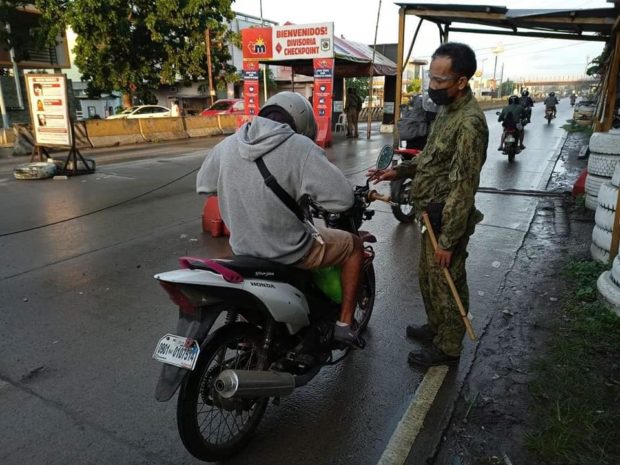DILG records over 107,000 health protocol violations on first week of November

SECURITY CHECK A police officer manning a quarantine checkpoint in Zamboanga City stops a motorist to check his documents as the local government tightens health protocols due to a recent surge in COVID-19 infections. —PHOTO COURTESY OF ZAMBOANGA CITY INFORMATION OFFICE
MANILA, Philippines — The Department of the Interior and Local Government (DILG) recorded over 107,000 violations of health protocols against COVID-19 across the country during the first week of November.

During President Rodrigo Duterte’s taped address to the nation aired on Wednesday, DILG Secretary Eduardo Año reported that a total of 107,858 health protocol violations were listed from October 31 to November 6.
“Sa pagluluwag po natin under Alert Level 2 at sa ibang mga karatig areas po na under alert level system, sa pagluluwag, nakita natin na nagkaroon din ng pagtaas ng violation ng mga tinatawag nating health standards and protocols,” he said.
(As Metro Manila eased restrictions under Alert Level 2 and other nearby areas under the alert level system, the shift caused a rise in the violation of health standards and protocols.)
The agency logged 71,959 violations on the non-wearing of face masks. Of which, 47,096 individuals were warned, 16,892 were fined or cited, 6,438 underwent community service, five were inquested, and 1,528 underwent regular filing.
Meanwhile, 34,972 individuals failed to observe physical distancing. Of the figure, 28,572 were warned, 4,909 were fined or cited, 1,099 had community service, eight were inquested, and 384 underwent regular filing.
As mass gatherings remain restricted, the DILG noted 927 violations of the health protocol. Three individuals had community service, 17 were fined or cited, and 907 were warned.
Año assured that the DILG will continue to implement the protocols to ensure the public’s safety amid the coronavirus’ threat.
“Tuloy-tuloy lamang po ang aming pagpapatupad ng mga protocols na ito, Mr. President, para po sabihin natin ang ating mga kababayan na susunod dapat sa public health standards,” he said.
(We will continue the implementation of the protocols, Mr. President, to remind our fellow Filipinos to follow public health standards.)
Earlier, the Philippine National Police (PNP) recorded 97,635 violations of minimum public health and safety protocols against COVID-19 in the National Capital Region (NCR) Plus areas from November 5 to November 8, or since Metro Manila was placed under Alert Level 2.
Nationwide, 144,295 violators of minimum public health and safety protocols were recorded for the same period — which means that 67 percent of the violations occurred in NCR Plus areas, including Metro Manila, and neighboring provinces of Bulacan, Cavite, Rizal, and Laguna.
Metro Manila deescalated to Alert Level 2 on November 5 until 21.
RELATED STORIES:
DILG may ask LGUs to explain for 10 million unuploaded vaccination data
DILG declares implementation of five-level COVID alert system ‘a success’